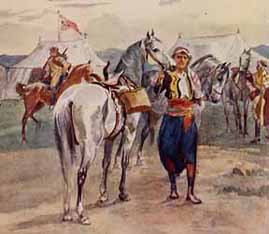
In the late 1890s a certain Elizabeth Butler, accompanying her British military husband, made one of those Protestant-style visits to Anglican nirvana, the Holy Land made somewhat less holy for her at the time by Ottoman Turkish troops. “The time of year chosen by my husband for our visit was one in which no religious festivals were being celebrated, so that we should be spared the sight of that distressing warring of creeds that one regrets at Jerusalem more than anywhere else,” she notes in the preface to her Letters from the Holy Land. Better to go in the off season, it seems, than face the reality of the individual Palestinian Arabs and Jews cluttering the biblical landscape. Her letters, written to her mother “lay no claim to literary worth,” as she humbly and astutely admits. The chief value of the work is, in her own ranking, her 16 color sketches, mostly pastoral pastiche, with the exception of an anonymous Arab attendant, shown here.
On February 28th she left Venice by ship to join her husband in Alexandria. “The horizon being lost we seemed to be floating through space, and the only solid things to be seen were the moon and our fellow planets and the stars, so that I felt as though I had passed out of this world altogether. Indeed, one does leave the ordinary world when shaping one’s course for Palestine!” she confides at the outset.
“Last night, when we arrived [at Port Said in Egypt], a barge of Acheron came alongside full of negroes in sooty robes, one gnawing a raw beef bone by the light of the torch in the bows. They were coming to coal us. and, being coaled, we shall draw light out of darkness, loveliness out of hideousness, and this evening we shall be taking our course to the Long-promised Land!” she continued.
“As our boat was the last to leave the steamer I had time to watch the disconcerting process of trans-shipping the other tourists who all went off in the first boats, and nothing I have ever seen of the sort could compare with what I beheld during those breathless moments. The effect produced by brawny Syrian boatmen tussling with elderly British and American females in sunhelmets and blue spectacles, and at the right moment, when the steamer heaved on starboard and met the boat rising on the crest of a particular wave, pushing them by the shoulders from above, and pulling them into the boat from below, was a thing to remember… The poor tourists said nothing; they hadn’t time given them for the feeblest protest, but they looked quite dazed when stuck down in their seats. Thanks to our kind friends we had a boat to ourselves and we were not worked off so expeditiously, being thus able to submit with something more approaching grace…”
In looking for the sites of her Sunday schooled youth there was almost an orgy of enthusiasm, but rudely tempered with the reality of a present not confined to the age of her beloved patriarchs. This is nowhere better illustrated than Butler’s frustrating tour of Hebron on April 13.
“We were up at five for our drive to Hebron. I longed to see this most ancient city and that mosque which, without any doubt whatever, covers the ‘double Cave of Machpelah’ which Abraham bought for his own and his descendants’ burying-place… think of it! If we could look into those tombs and see the very bones of Abraham and Isaac and the mummy of Jacob, for the Bible tells us he was embalmed according to the manner of the Egyptians. Altogether, though, our visit to Hebron has rather given me the horrors…”
“It was a wilderness of stones, where the big lizards of Palestine were in strong force, panting over the top of every rock, their black heads and goggle eyes upturned to the burning sky in a very comical way. Close to Hebron is a nice cool German hostelry, where we rested before descending to the gloomiest town I have ever seen in the East, with some of the bazaars like tunnels, into which scarcely any light could enter. Here in the gloom we met insolent-looking Moslems and spectral Jews, their strongly-contrasted figures and faces appearing for a moment in the twilight as they passed us. And outside it was blinding noontide sunlight. We went all around the huge mosque that guards the precious tombs of the patriarchs, but had we attempted to enter we should have had a bad quarter of an hour from the Mahometans. These sons of the Bondwoman would stone any son of the Free who would attempt an entry. There is a little black hole in the wall, which I am sure does not pierce it through, which we are told we can look through and see the tombs from outside, but I saw nothing in the hole but the beady eye of a lizard. We do not feel as though we would care to revisit Hebron.”
The hazards of being a spiritual descendant of Abraham, when Ishmael’s lot held the keys to the tomb. More than a century has passed, but the gloom remains, at least for those curious pilgrims looking in from the outside.
[Excerpts from Elizabeth Butler, Letters from the Holy Land, London: Adam and Charles Black, 1912, first published in 1903.]
Daniel Martin Varisco